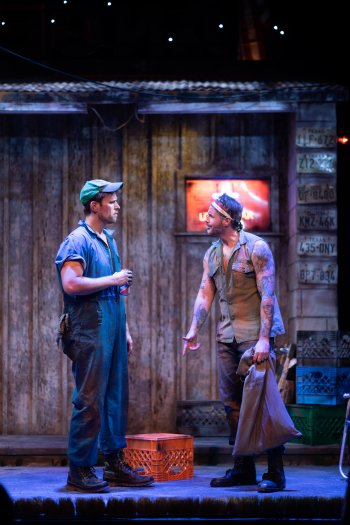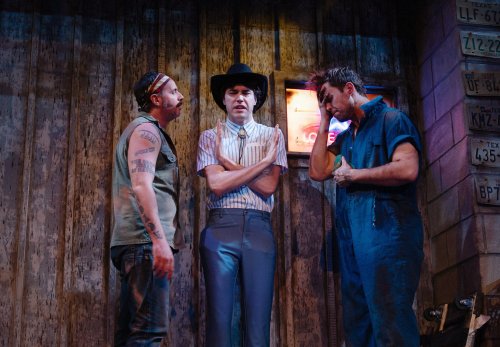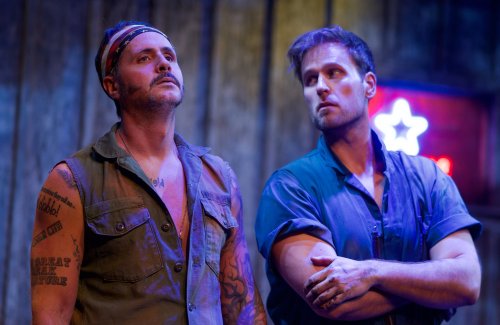Lone Star
James McClure’s now classic play about Post-Vietnam PTSD gets treated to a new production and two new scenes that confirm PTSD is very much a family affair.

Dan Amboyer and Matt de Rogatis in a scene from Ruth Stage’s production of James McLure’s “Lone Star” at Theatre Row (Photo credit: Miles Skelli)
[avatar user=”Tony Marinelli” size=”96″ align=”left”] Tony Marinelli, Critic[/avatar]
There’s an old adage, “If it ain’t broke, don’t fix it.” Apparently, and thankfully, this doesn’t apply to James McLure’s Lone Star, originally presented at New York City’s Century Theatre in the summer of 1979. The play has gone on to be a staple of professional regional theatres for decades and has provided acting classes their go-to scenes for two men since Dramatists Play Service first made the script widely available. It has stayed very much in our consciousness over the years as a story of a man who “did his time” in the service of our nation trying to reassemble now-shattered fragments of his pre-war life.
Probably only David Rabe’s Sticks and Bones (part of his Vietnam trilogy that included The Basic Training of Pavlo Hummel and Streamers) is as demonstrative as Lone Star in its depiction of a soldier’s inability to easily pick up from where he left off upon returning from a tour of duty. For this production, Ruth Stage, in an adaptation by director Joe Rosario and actor Matt de Rogatis, has been given the rights to append the character of Elizabeth to the original Lone Star cast. Her character is from a companion McLure play, Laundry and Bourbon, which has a history of being performed in repertory with Lone Star. Elizabeth is Roy’s wife, therefore Ray’s sister-in-law.
What has long been treated as a “male” play, this production of Lone Star now gives us the wife’s perspective of a man she has loved since the day she first met him. He has always been a wild unmanageable man, even more so since returning from Vietnam. Her extended monologue at the beginning of the play fills in some of the blanks – he disappears for four-day poker parties and brief flings with women in neighboring towns, “Any man worthwhile is gonna look at another woman. That’s natural. And sometimes they wander a bit…Last year he took off for five days.” The only time she knows where he is is when he commandeers the backyard behind Angel’s bar, a local dive in their town of Maynard, Texas, for a solo drink fest of six-packs of Lone Star beer. Elizabeth takes it all in stride, “I don’t want to manage him. I don’t want to break his spirit.”

Ana Isabelle in a scene from Ruth Stage’s production of James McLure’s “Lone Star” at Theatre Row (Photo credit: Miles Skelli)
In her monologue, Ana Isabelle, as Elizabeth, gives us a touching portrayal of a woman who is torn, but still leaning on keeping the man she had dated since high school. She accepts sometimes playing second fiddle to his 1959 pink Thunderbird convertible, “Roy’s never gonna get rid of that Thunderbird. He loves that car…He says it can take him where he wants to go. I don’t think he has any idea. Sometimes I think he loves that car more than me.” Isabelle gets to punctuate these emotions beautifully accompanying herself on guitar with Linda Ronstadt’s “Long Long Time.” Perhaps Tammy Wynette’s “Stand by Your Man” would have been too obvious. We discover that deep down they stay together because they both yearn for those same feelings that they shared when they first dated. “What I wouldn’t give to have those nights again…Just one night when the back seat of that Thunderbird was sweeter than all the beds in the world.”
Director Joe Rosario has a painterly way about his work in the play. He gets us to care deeply for the characters…okay, truthfully, we couldn’t “give two rats’ asses” for whether the character of Cletis (referred to as Skeeter and played as a rapture of smarminess by Ryan McCartan) either lives or dies, especially after he totals Roy’s treasured car in a quick romp upon finding the car keys left unattended on the bar. But even there, Rosario has crafted complete portrayals filled with nuance and vivid contemplation of next steps for each character. Cletis has decided that the only thing that separates him from being like Roy, who he professes to emulate, is that car. McLure describes Cletus, “His life should have been terminated in high school. He married the first girl he dated that didn’t spit on him.” Therefore, we understand his next steps when we see the car keys, but we can also predict how this little joyride will go predictably wrong.
Another great brushstroke from Rosario once Elizabeth’s scene ends is the use of TV network news coverage of the war with onstage projections. Moving images of helicopters, demonstrations and news swatches of Presidents Johnson and Nixon point at how the Vietnam War was the first televised war the same way we think of JFK as being the first “television president.” The footage gradually merges into comic representations taking on the aspects of a graphic novel. Comic book illustrations by Legacy Comix and graphic design by BrandMark NJ are an invaluable addition to this production. Even as the play ends, we follow another graphic novel path of the history of Roy’s and Elizabeth’s courtship culminating in their embrace and a hopeful future for them.

Matt de Rogatis, Ryan McCartan and Dan Amboyer in a scene from Ruth Stage’s production of James McLure’s “Lone Star” at Theatre Row (Photo credit: Miles Skelli)
The lodestone of the play lies in the relationship created before our eyes by the actors playing the two brothers, here Dan Amboyer as Ray and Matt de Rogatis as Ray’s older brother Roy. In real life, it’s ironic how things happen. It is incredible to believe that this symbiotic relationship we see is so exacting as Mr. Amboyer came into the production late to replace an actor who left unfortunately for medical reasons. It is hard to imagine this high-octane performance was once otherwise cast differently. A lot of their conversation relies on quick-witted responses with perfect timing that comes from the most impeccable rehearsal technique.
Dan Amboyer as the younger brother Ray embodies that hunk-that-doesn’t-know-it that draws your attention on the pages of Lands’ End or L. L. Bean catalogs. His deliveries sometimes come from nowhere. Roy: “Shit, I saw people without heads.” This is followed by Ray: “Were they dead?” hence older brother Roy explaining it away by insinuating Ray is brain damaged and that both Roy and Mom kept that fact from Ray, “Not so dumb I didn’t go to Nam and get myself shot.” He dutifully listens to Roy’s exploits in “Nam” for the umpteenth time, providing the “hms” and “oohs” right on cue like he has done so many times before. When Roy counters “What do I want to go in there for? It’s just a juke joint with a lot of sluts and rednecks who want to break your nose for you,” Ray responds with, “But that’s your kind of place, Roy, “without missing a beat.
Matt de Rogatis as Roy embodies the uneducated and belligerent tough guy. His army service only adds to that unapproachable mystique. His first impulse is to be a hellraiser. In planning a trip to the Cotton Bowl, he tells us, “We’re gonna get a room on the tenth floor in Downtown Dallas…and throw all the furniture out the window.” Where Ray has the potential to pass for human in his L. L. Bean ad, Roy is more the Bass Pro Shop guy just angling to get that fishing hook attached to a bodily part so he can have a tattoo inked around it. As Ray starts to tease what happened to the car, Roy breaks in, “That car’s been some kind of a pussy wagon. That there car’s my youth…Do you realize that I’ve had more tail in that car than anybody else in this whole town?”

Matt de Rogatis and Dan Amboyer in a scene from Ruth Stage’s production of James McLure’s “Lone Star” at Theatre Row (Photo credit: Miles Skelli)
Discovering that Ray had relations with Elizabeth while Roy was in Vietnam, he confuses the definition of adultery with that of sodomy. In planning his attack on Cletis for the “murder” of his Thunderbird, “I’ll strap him to the rear bumper and drag the sonofabitch…wait a minute. I don’t even have a rear bumper no more. Can I borrow your pickup?” de Rogatis is brilliant at pivoting from one anger to the next. He milks the more analytic side of Roy for every drop of humor he can pull from the anger of the moment, “Old Wayne. Shit. Everyone I knew is either married, moved to Oklahoma, or shot their foot off, and I can’t decide which is worse.”
Matt Imhoff’s set design is intentionally claustrophobic despite the fact it takes place outside. The backyard of Angel’s Bar is a safe space for Roy, though littered with beer cans. Christian Specht’s lighting design is sensitive to the fact the play takes place in the wee hours of the morning – appropriately enough to keep them out of the dark. Tomás Correa’s projection and sound design are robust from setting the early sounds of choppers on the battlefield down to recognizing there are still other denizens of Maynard, Texas, in the bar while all the action is going on in front of us.
We may not have realized we needed another version of Lone Star, but don’t let the fact that there are fewer people around these days for whom a story about a Vietnam veteran and his brother resonates keep you from having a good time. It’s definitely worth the trip to West 42nd Street to find this little corner of untouched Texas.
Lone Star (through December 23, 2023)
Ruth Stage
Theatre One at Theatre Row, 410 West 42nd Street, in Manhattan
For tickets, visit http://www.bfany.org
Running time: 90 minutes without an intermission






Leave a comment